Olaf E. writes: Hello guys, a piece of American history. Located in Pelousey, France (east north, near the Swiss border), asking price Euro 12,000.00. It’s advertised here on eBay France. I wasn’t familiar with the story of Spartan Trailers before researching this post and it’s a fascinating read. Oil tycoon J. Paul Getty purchased a successful aircraft company prior to World War II, but post-war he had to find something for the factory to build. They decided to build the best travel trailers (they called them homes) available using aircraft-type design and manufacturing. This Spartanette is actually the smallest model offered in 1950, but still cost $3,450.72 when new, roughly twice the price of a Chevrolet Bel Air. Of course, it would be a lot tougher to live in the Chevrolet! This particular one was purchased in Canada and shipped to France by the current owners, who have renovated some items but there’s still a little left to finish.There’s a lot of information on this website if you are interested in learning more. Where these trailers really shined is the interior, and there are some great pictures included in the auction listing. I can see buying this and traipsing all over Europe on one heck of a vacation, then selling it on to another enthusiast!
- Kitchen
- Bedroom
- Look at the curved birch!
- Even the screen door is beautiful
- Kitchen table as styled as the rest
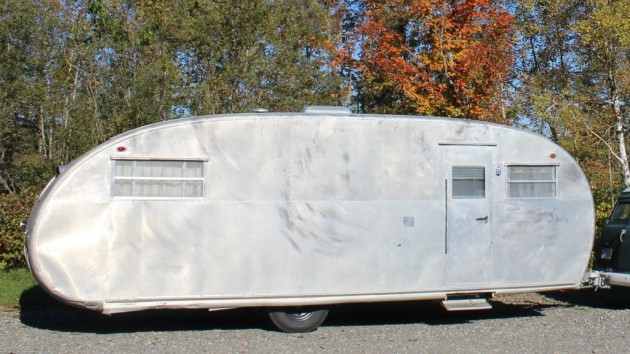
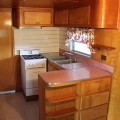
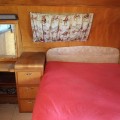
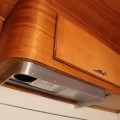
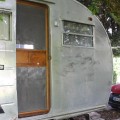
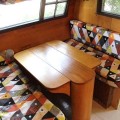





As much as I love timber, this interior is overkill. Thank heaven caravan design has moved on. I also hate pokey little windows.
What a beautiful camper. Personally I’m digging all the woodwork inside. Truely made by craftsman whos talent shines through. As somebody who has been traveling the US in my motorhome since December 2014 I can see using this to travel Europe as mentioned and selling it on without any loss. I’ve owned modern and vintage campers and the vintage campers are still very usable and comfortable. The price seems fair given the condition.
Its a beauty! I too love all the woodwork inside, I’m sure it added to its curbside weight, but it is warm and home-like inside. My question is this: What did they use to haul this bad boy around in the 50’s? Here in the states, we had pick-ups, but in my time in Germany in the mid-70’s, I didn’t see too many, if any, vehicles built to tow something this heavy.
This is a bit long winded but very informative;
http://oppositelock.kinja.com/tow-me-down-1609112611
Probably not as heavy as you’d think. The woodwork is just a veneer, typically the stuff underneath was a much lighter wood, like pine. And very thin at that! Cool trailer..
I actually FOUND a Spartan trailer parked near a lake back in the mid-90s. It had been sitting so long there was a medium size tree growing up in the hitch space. Asked at all neighboring cottages and nobody claimed to know anything about it or who owned it. Old rusted padlock & hasp on the door, all the windows had been left open about an inch so the interior was all musty and mildewy. Just from the windows I could see the completely original interior but the floor was completely rotted out and the trailer itself was on blocks with the axle long gone. I dreamed for a year or so of somehow getting it to roll and restoring it to usable condition!
BTW, google ‘spartan spartanette’ and look at the pics. When these are polished up they ought to be illegal to be on the road, it’s so SHINY!! o_0
This is actually the WORST you can do to aluminum finish.
The original panes had a protection layer that now has been ground down.
Besides it looks better in satin finish, not pimped up like this one.
I wd not want to tow it around europe … but …… find a nice spot and have a vacation house.
I really doubt there was any protective finish, I’ve never heard of such a finish from that era.
Polishing aluminum was the norm in automotive applications for decades before clear coat.
All that wood is a lot of work if there were any leaks, but once done is beautiful compared to the cheap new crap that will be trash in 10 to 20.years. our 2017 is light but everything is almost cardboard…
Spartan never made a travel trailer. These were early mobile homes. To be considered a travel trailer, the unit has to be self contained, a feature that Spartan’s never had. Lots of people tow them as TT’s due to most of them being 8 feet wide. Spartan’s have a 120 volt electrical system, unlike a TT which has a 12 volt system and a 120 volt system. Some of the larger Spartan’s were wired as 240 volt. On a TT the appliances run off of 12 volts, or LP gas, and the unit can be operated without being plugged in to a 120 volt outlet.
TT’s have a holding tank for black water and another for grey water. The toilets use very little water with each flush, so that the unit can be used for a while without being connected to a sewer system. Spartan’s have a toilet similar to a home that flushes from a tank mounted on the back of the commode. TT’s also have a fresh water tank and either a pump, or air compressor on older models so that one has an available fresh water supply onboard the trailer. Spartan’s have none of these self contained features, and require a utility connection for the systems to operate.
Spartan’s were built with an aluminum structure inside of the walls. The birch plywood interior, the cabinets, and the flooring are the only wood in the unit. The construction is similar to a modern Airstream and some Holiday Rambler coach’s built in the 60’s through the 90’s. Steel frame under the floor with plywood flooring, aluminum construction above the floor line with aluminum skin on the exterior and birch plywood finishing out the interior.
We owned a 1959 Spartan Royal Mansion 53 foot unit that we converted to a travel trailer. The unit was lightweight and well balanced. Since it was 8 feet wide, it could be licensed as an RV, although that was fudging the laws a little bit. We towed the unit with a Silverado Crewcab dually pickup and it towed wonderfully. Many campgrounds have length limits so there were always issues finding a place to park it. Since we kept it on a lot on a lake most of the time, it was not much of an issue for us. We moved it when the lake was expected to reach flood stage, and moved it back when there were no threat of flooding. We stored it in a hay barn on our farm during the winter months which gave us ready access to do maintenance and repairs to have the unit ready for the next spring.
Spartan built a few 10 wide units, although the majority were 8 feet wide. Spartan’s are a favorite with carnival owners and such as they are the toughest little caravan or mobile home ever built.
http://tse1.mm.bing.net/th?id=JN.MsSQr7Lb%2bbANO9dDNjAhzg&w=129&h=105&c=7&rs=1&qlt=90&pid=3.1&rm=2
http://www.allmanufacturedhomes.com/1959_spartan_10x50.htm
This is the Spartan 10 wide
Barn finds has discovered Spartans.
I hate to disagree with Charles.
A lot of the measurements and regulations were made long after these ‘house -trailers’ were built.
The Spartanette is probably one of their least becoming designs.
The windows were small , because this was in the late forties.
Some of their 50 ies models are beautiful.
One of those was used in an “I love Lucy” episode.
Are you thinking of the Long-Long trailer with Lucile Ball and Dezi?
If so that was a New Moon trailer.
https://en.wikipedia.org/wiki/Airstream
If you read the history of the Airstream, the first one was built in 1936. It carried it’s own water supply, and thus is considered self contained. Early self contained units often had propane lamps, propane powered absorption refrigerators, and propane radiant heat. Spartan’s used mobile home type appliances that required connections to utilities to be able to operate. Being self contained is the major difference between a travel trailer and a mobile home.
Spartan’s were built after WWII until 1959-60, long after the differences between travel trailers and mobile homes were established.
As I said before, Spartan’s are mobile homes. They are built with such durable standards that they lend themselves well to conversion as a TT, and many have been converted and are still on the road today.
There is a lot of confusion between TT’s and mobile homes, especilly in regards to the early models when the size differences between types of units were minimal. And granted some mobile homes back in the day were towed regularly on the highway.